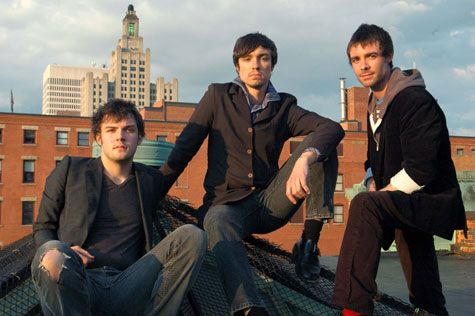
IT’S ELECTRIC Martin O’Connor, Brendan Britton, and Benjamin Britton of Triangle Forest bring synth to the city . |
It is, of course, difficult to attach a single sound to a city. And Providence is no exception.
There is hip-hop, here. Metal, too. And the city’s most prominent act at the moment, Deer Tick, is a sort of drunken, gravelly take on alt-country.
But this is, at bottom, a rock ’n’ roll metropolis.
LISTEN:
Name by Llove [mp3]
Spanish Eyes by Triangle Forest [mp3] Robot Sings For the Master (Llove remix) by Triangle Forest [mp3] Tame by <tfo> [mp3] |
Providence is guitars and bass and drums. Distorted, perhaps. Played by the costumed and the crazed, from time to time. But engaged, nonetheless, in the rock.
So there is something intriguing about the emergence, in recent years, of an alternative to all the shoe-gazing and head-banging: a small band of electronic music acts — touched by the fury of the city’s noise scene, to be sure, but just as interested in ’80s schlock, gold chains, and dancing.
Lots of dancing.
The city’s most prominent electronic acts — MAHIMAHI, Triangle Forest, Llove, <tfo>, the Awesome Brothers, and Kokomo among them — do not attract the crowds that flock to Providence hard rockers like White Mice and Megasus.
And their sound does not quite play to Rhode Island’s dark moment (the soundtrack of the unemployed is light on synthesizers).
But the electronic scene, whatever its limitations, seems to be reaching a critical mass of sorts. There are more bands than in recent memory. An all-digital label with a heavy focus on electronica has sprouted here. Two of the city’s leading acts — Spanish Dancer and makeupbreakup — have just finished small national tours.
And local bands are hooking up, on the Internet or on double bills, with like-minded souls in New England and beyond — acts like Big Digits in Boston, Electrocute in Los Angeles, and Chairlift, a Boulder-turned-Brooklyn outfit that landed a song on an iPod commercial, signed with Columbia Records, and is touring with the Killers.
“Things have opened up,” said Timothy O’Keefe, sitting in his Jewelry District loft on a recent morning, surrounded by keyboards, a computer, and a disturbingly large collection of throwback video game consoles.
O’Keefe, the principal force behind <tfo> and Cozy Music, the digital label, is the closest thing Rhode Island has to a godfather of the electronic scene.
Now 35, he grew up in North Kingstown in thrall of Depeche Mode and New Order. And after graduating from high school, he joined with a few partners to throw what may have been the city’s first full-scale rave — Michelangelo, named after a computer virus that surfaced in New Zealand in April 1991.
Over the next three years, O’Keefe staged three of his own events under the banner of “A Rave Called Quest,” part of a traveling, DJ-centered, ecstasy-fueled Northeastern scene that stretched from Portland, Maine to New York City.
There were a few notable Providence acts during this period, including Emergency Broadcast Network, which spliced beats, hooks, and cable television clips into an audio-video menagerie that animated U2’s outsized Zoo TV tour.
But O’Keefe said electronica failed to gain much traction in a city more inclined to see authenticity in the raw work of Nirvana and other grunge acts from the Pacific Northwest.
“When a lot of this stuff was going on, a lot of the Seattle stuff was going on, and bands were going the Seattle route,” he said. “There was a little bit of dismissiveness [around] electronic music.”
The scene remained on the fringes amid the rise of Fort Thunder and the other underground art and music spaces that took root in the Olneyville section of Providence in the mid-1990s and beyond.
Noise was king in those days, with the chaotic, dissonant Lightning Bolt leading the charge. And for some, like painter and electronic musician Dan Voknine, what many hailed as a moment of cultural ferment was actually a fallow period.
The Olneyville scene, with its aggressive, bearded men, was retrograde — even conservative, he said. And the alternative — the city’s DJ-based “intelligent dance music,” or IDM, scene — was becoming academic, ponderous. “A bunch of people standing around a room as if in a competition to see how [little] fun they could . . . have,” said Voknine, 33.
But others saw the beginnings of something new. There were a few experimental electronic acts that cycled through Olneyville – Libythth, the Rah Bras, and Quintron, among them. And some of the city’s post-punk outfits, most notably Six Finger Satellite, incorporated cyborg and synth elements.